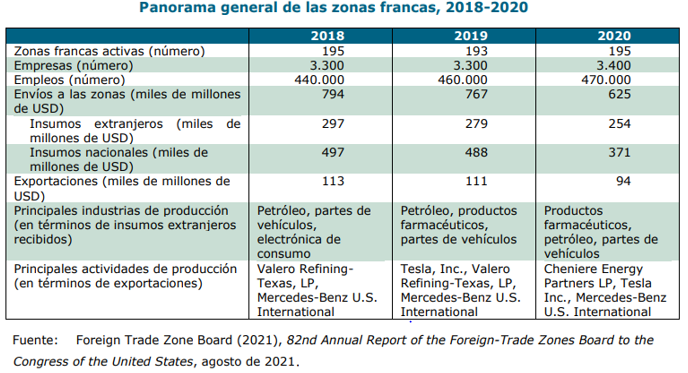Tesla and Valero Refining Texas lead in the use of free trade zones in the U.S.

Tesla, Valero Refining-Texas LP, Mercedes-Benz and Cheniere Energy Partners LP are among the largest users of free trade zones in the United States, based on the main production activities in terms of exports, according to information from the World Trade Organization (WTO).
In the United States, the manufacture of certain products and product groups and the conduct of certain activities are either prohibited by regulations or are not authorized in practice by the FTZ Board for various reasons.

For example, the production of alcohol, tobacco, firearms, steel, textiles and sugar and the mixing of petroleum products are not permitted.
Some of these restrictions stem from issues related to tax evasion or security, but many reflect trade concerns such as circumvention of quotas or other trade measures, or apply to products that have traditionally been sensitive to imports.
Nevertheless, a wide range of activities, particularly production and distribution, take place in FTZs.
Tesla
During the last four years, the main production sectors were petroleum, pharmaceuticals and vehicle parts.
The most important export activities were also concentrated in automotive manufacturing/assembly and oil refining.
The same period saw significant growth in pharmaceutical production activities, spurred by responses to the Covid-19 pandemic, and electric vehicle production.
Compared to those of other countries, U.S. FTZs are somewhat unique in that they facilitate importing into the U.S. market rather than exporting to foreign markets.
In addition, they function largely as an extension of the domestic industry, as the majority of shipments coming into the FTZs are of domestically produced materials, and 63% of shipments from the FTZs are largely destined for the U.S. market and consumers.
During the referenced period, according to the WTO, there has been increased attention to FTZs and their policy, which have attracted increased interest primarily due to the economic and trade costs of the tariffs imposed in 2018 under sections 201, 232 and 301.
![]()

